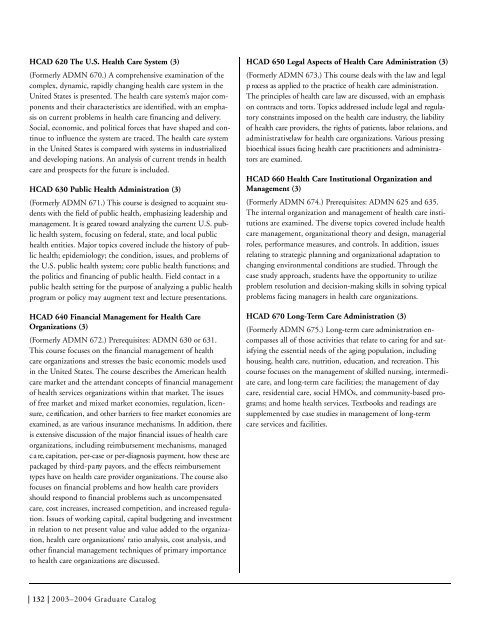A+B. Intro_SJ.1 - University of Maryland University College
A+B. Intro_SJ.1 - University of Maryland University College
A+B. Intro_SJ.1 - University of Maryland University College
Create successful ePaper yourself
Turn your PDF publications into a flip-book with our unique Google optimized e-Paper software.
HCAD 620 The U.S. Health Care System (3)<br />
(Formerly ADMN 670.) A comprehensive examination <strong>of</strong> the<br />
complex, dynamic, rapidly changing health care system in the<br />
United States is presented. The health care system’s major components<br />
and their characteristics are identified, with an emphasis<br />
on current problems in health care financing and delivery.<br />
Social, economic, and political forces that have shaped and continue<br />
to influence the system are traced. The health care system<br />
in the United States is compared with systems in industrialized<br />
and developing nations. An analysis <strong>of</strong> current trends in health<br />
care and prospects for the future is included.<br />
HCAD 630 Public Health Administration (3)<br />
( Formerly ADMN 671.) This course is designed to acquaint students<br />
with the field <strong>of</strong> public health, emphasizing leadership and<br />
management. It is geared tow a rd analyzing the current U.S. public<br />
health system, focusing on federal, state, and local public<br />
health entities. Major topics covered include the history <strong>of</strong> public<br />
health; epidemiology; the condition, issues, and problems <strong>of</strong><br />
the U.S. public health system; core public health functions; and<br />
the politics and financing <strong>of</strong> public health. Field contact in a<br />
public health setting for the purpose <strong>of</strong> analyzing a public health<br />
program or policy may augment text and lecture presentations.<br />
HCAD 640 Financial Management for Health Care<br />
Organizations (3)<br />
(Formerly ADMN 672.) Prerequisites: ADMN 630 or 631.<br />
This course focuses on the financial management <strong>of</strong> health<br />
care organizations and stresses the basic economic models used<br />
in the United States. The course describes the American health<br />
care market and the attendant concepts <strong>of</strong> financial management<br />
<strong>of</strong> health services organizations within that market. The issues<br />
<strong>of</strong> free market and mixed market economies, regulation, licensure,<br />
c e rtification, and other barriers to free market economies are<br />
examined, as are various insurance mechanisms. In addition, there<br />
is extensive discussion <strong>of</strong> the major financial issues <strong>of</strong> health care<br />
organizations, including reimbursement mechanisms, managed<br />
c a re, capitation, per-case or per-diagnosis payment, how these are<br />
packaged by third - p a rty payors, and the effects re i m b u r s e m e n t<br />
types have on health care provider organizations. The course also<br />
focuses on financial problems and how health care providers<br />
should respond to financial problems such as uncompensated<br />
care, cost increases, increased competition, and increased regulation.<br />
Issues <strong>of</strong> working capital, capital budgeting and investment<br />
in relation to net present value and value added to the organization,<br />
health care organizations’ ratio analysis, cost analysis, and<br />
other financial management techniques <strong>of</strong> primary importance<br />
to health care organizations are discussed.<br />
HCAD 650 Legal Aspects <strong>of</strong> Health Care Administration (3)<br />
( Formerly ADMN 673.) This course deals with the law and legal<br />
p rocess as applied to the practice <strong>of</strong> health care administration.<br />
The principles <strong>of</strong> health care law are discussed, with an emphasis<br />
on contracts and torts. Topics addressed include legal and re g u l a-<br />
t o ry constraints imposed on the health care industry, the liability<br />
<strong>of</strong> health care providers, the rights <strong>of</strong> patients, labor relations, and<br />
a d m i n i s t r a t i ve law for health care organizations. Various pre s s i n g<br />
bioethical issues facing health care practitioners and administrators<br />
are examined.<br />
HCAD 660 Health Care Institutional Organization and<br />
Management (3)<br />
(Formerly ADMN 674.) Prerequisites: ADMN 625 and 635.<br />
The internal organization and management <strong>of</strong> health care institutions<br />
are examined. The diverse topics covered include health<br />
care management, organizational theory and design, managerial<br />
roles, performance measures, and controls. In addition, issues<br />
relating to strategic planning and organizational adaptation to<br />
changing environmental conditions are studied. Through the<br />
case study approach, students have the opportunity to utilize<br />
problem resolution and decision-making skills in solving typical<br />
problems facing managers in health care organizations.<br />
HCAD 670 Long-Term Care Administration (3)<br />
(Formerly ADMN 675.) Long-term care administration encompasses<br />
all <strong>of</strong> those activities that relate to caring for and satisfying<br />
the essential needs <strong>of</strong> the aging population, including<br />
housing, health care, nutrition, education, and re c reation. T h i s<br />
c o u r s e focuses on the management <strong>of</strong> skilled nursing, intermediate<br />
care, and long-term care facilities; the management <strong>of</strong> day<br />
care, residential care, social HMOs, and community-based programs;<br />
and home health services. Textbooks and readings are<br />
supplemented by case studies in management <strong>of</strong> long-term<br />
care services and facilities.<br />
| 132 | 2003–2004 Graduate Catalog

















